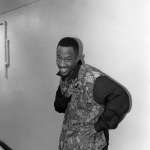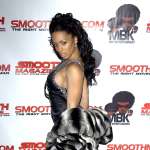The G-List is TheUrbanDaily.com’s annual celebration of 40 influential men from various walks of life who define what it means to be a trendsetter with style in their field.
Name: Nelson George
From: Brooklyn, NY
Occupation: Author/Director
Affiliation: BlackAtlas.com
Nelson George makes the life of a writer seem all too cool. With the release of yet another book, The Plot Against Hip Hop, George is further proof that the lifestyle of sitting in front of a computer at coffee shops all day can pay off. With his unique hip-hop perspective, the Brooklyn-native has now spread his influence across multiple platforms, including television and film. So there, the pen is indeed mightier than the sword.
You’re a writer, a producer and a cultural expert. What do you feel people mostly identify with your name?
As someone who has been in media for a while, you get a certain following for your work. It’s funny, more people have seen me in the documentaries I’ve done about various music and culture than they have from reading my books. The irony of that is that you’re not influencing people in the way you originally intended. I find that wherever I go, that almost every Black doorman knows who I am. They must watch a lot of music documentaries. I’ll be in some spot and the big Black guy in a T-shirt will look at me and go, ‘Let him in.’
Tell me about your new book, The Plot Against Hip Hop?
It’s a conspiracy thriller based around the ideas and debates of hip-hop culture. Anyone who grew up in the 90s, or early 80s, most of those folks don’t like contemporary hip-hop, and they have various thoughts about this. Let me take this idea and create a character around who that guy is. The journey of the book is through the history of hip-hop. And that’s really what sparked it. I’m a big fan of L.A. Confidential. I like the idea of taking real events and creating a fictional subtext about what happened. In the book, The Plot Against America, Philip Roth created a reverse history of what happened in
America. All of that inspired me to do this. I just had to figure out what the hell the plot was.
Who is your favorite author?
My favorite author growing up was [Ernest] Hemingway. Now, if you ask me that same question[now], it would probably be James Elroy’s work. It’s a little racy, but has a lot of energy. I still read The Great Gabsy by F. Scott Fitzgerald. Richard Wright. And I sample a bunch of things. This year, I made it a goal to read the Parker Novels, about the fictional criminal. The guy did 17 of these books. I read through every book this year. The Mel Gibson movie, Payback, is based on this character. There’s a couple of movies made about this character. They are really well-written and really well-plotted.
Are you a book snob? Or do you ever pick up a ghetto novel that people don’t expect you to be reading and get into it?
No. That would be my answer. I picked up street lit before, and for the most part, I put it down. I like books that are well-written. I like The Coldest Winter Ever [Sister Soulja]. I like good writing.
Since we’re going to be talking about grooming, I thought it was interesting that you were involved in the making of Chris Rock’s Good Hair. How did you guys come to work together on that project?
One, because he asked me to. It was his idea. I really at the time wasn’t that interested. But he told me to come on board as Executive Producer and help out. And we went to India together with the crew, which was an amazing experience. I ended up being very involved. One of the things that people don’t know is that it really is very much a global film. It’s on DVD, in theaters or on cable, and has played everywhere from South Africa to Denmark. There is an incredible amount of interest in Black women and the culture of hair. It’s had a remarkable wide audience.
So how would you define “good hair?”
My mother would use that term. It was wavy soft hair. That was what it was growing up in the Black community. We were using that context for the film, it’s an ironic take on what “good hair” means. It was a dual use title. That term that resonates for Black people is not the same for White people.
How particular are you about your grooming?
I go to a barber every two to two and a half weeks. I go down to Astor Place, to a guy named Speedy. He cuts Spike Lee’s hair, Mos Def’s hair. He’s got a little celebrity thing going. I enjoy the spectacle of the place. Now that I’m older, I’m much more comfortable with letting my beard grow out gray. Now, I’ll let it get really thick before I go, and I’ll let some gray in my head. Women tell me they like the gray better. When I started letting my hair grow gray, I had an amazing amount of women come on to me. I’m like, ‘You mean if I would have just left it in earlier, this would have happened sooner?’
The G-List is TheUrbanDaily.com’s annual celebration of 40 influential men from various walks of life who define what it means to be a trendsetter with style in their field.
The G-List Is Sponsored By
<p>Facebook Live Is Loading....</p>




